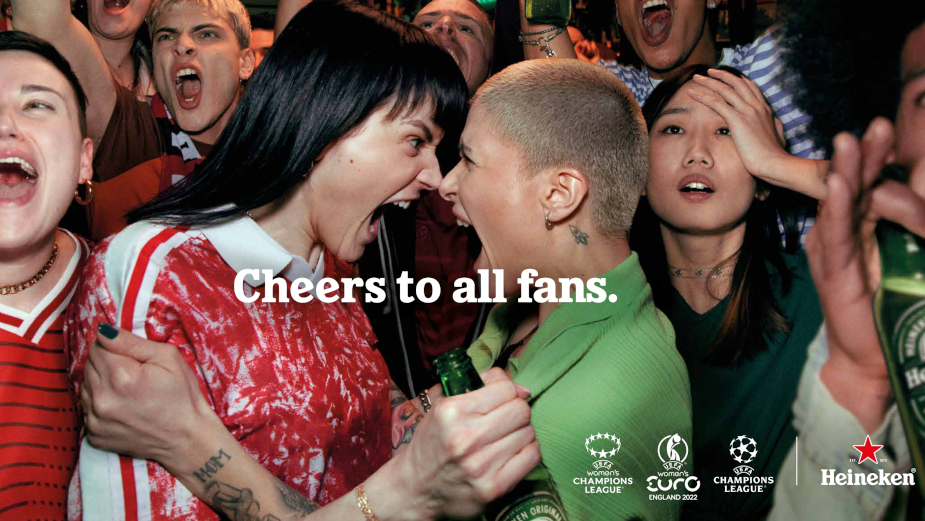
Will the Euros Success Change the Game for Brands and Women’s Sports?

On Sunday, the 31st of July, sports history was made with England’s team winning the UEFA Women’s EURO 2022, against long-standing rival Germany. Not only did the fateful moment put a woman in her sports bra, celebrating the height of her career, on the front pages of all papers nation-wide, without her objectification or sexualisation, but the moment immediately felt like a cultural reset for sports and women’s representation. Inclusion of women in classically male-dominated sports fields, such as football, has been a slow, inconsistent burn. However, the public engagement in this year’s championship and that electric, long-anticipated winning goal on Sunday, could prove to be a genuine game changer. A sold-out Wembley stadium hosted an enthusiastic crowd that looked a bit different to the typical audience of footie fans. And a whole country was moved to tears when the Lionesses finally ‘brought it home’.
So what might the lasting legacy of this historic moment look like? In the marketing world, it certainly proved the value in supporting women’s sports, with brands like Heineken, Booking.com, Alipay, Visa, Nike enjoying record viewing numbers. The fact is that UEFA only recently de-coupled men’s and women’s team brand sponsorships. Up until a few years back, brands sponsoring the men's game would end up with a package deal, where they also get the women's teams tagged along. Melanie Baroni, business director at M&C Saatchi Sports & Entertainment reminded that a lot of Premier League clubs still operate on the package system. “It was really interesting actually to see that case study of decoupling everything come to life. It just worked,” says Melanie.
“The brands who ended up in the women’s game space were so focused on supporting women, not just in the sport, but also more generally. They put their money where their mouth is essentially. It wasn't just a tag on sponsorship. It was something that was brilliant to see come to life and there were so many campaigns and serious brands that did a lot for the game in their own space,” she continues. Indeed, brands such as Visa, Barcleys and Heineken, took the ‘go big or go home’ approach to sponsorship and really doubled down on the women’s game this year.
Tom Lindo, strategy director at FCB Inferno, believes that even though the legacy of the win will open a lot of opportunities for the women’s game to sit at its rightfully earned place next to the men’s, this will certainly provoke brands to step forward as well, but the process needs to be genuine and seamless. “The ways in which brands leverage this opportunity in communications needs to be underpinned by their behaviour,” says Tom. “It’s understandable that many are taking advantage of this incredible moment – but they need to make sure it translates into meaningful impact. Whether that’s by giving professional players the sponsorship deals they deserve, or by using their platforms to further relevant grassroots causes.”
For example, Uber’s activation that covers fares of Powerleague’s women footballers over darker months, according to Tom, will do much more for women’s sport than campaigns that solely seek to break social stereotypes. Or Barcleys’ help for delivering equal access to girls in highschool, which Melanie expands upon. “Such long-term thinking builds credibility beyond the tournament and will be the true marker of whether brands and sponsors are really walking the walk, changing the way we talk about sport and, ultimately, driving participation,” tells Tom.
There’s also something in the openness and authenticity surrounding this particular tournament. “Every girl and woman has a period and being able to talk about that and the impact it has on performance, which is not tested enough at all. There is so much sports science around men’s bodies and men’s psychology, but that’s changing and people are talking openly about it. Nothing should be a taboo subject anymore. The fact that those conversations are happening is fantastic. I think women and girls just being seen as just themselves enjoying sport is pretty huge,” says Melanie.
Another major shift that the tournament marks is that conversations around women’s football don’t need to start on a back foot. There’s no need for chippy comparisons or holding up negative stereotypes to rip them down or subvert them. “We need to move beyond the defensive mindset that has coloured the approach to communications on women’s sport,” says Tom. “It only helps to perpetuate outdated and negative perceptions, which may have been relevant five years ago, when ‘This Girl Can’ was just out and the WSL went professional, but simply aren’t anymore. We don’t see this when brands contribute to conversations about tennis, gymnastics, or athletics; and the Lionesses have more than earned the right for it not to be necessary in football. People were watching the Euros because the football was great - not because they were being asked to support the women’s game.”
Six weeks ago, Dark Horses put out a report called “The Seven Deadly Sins of Marketing Women’s Sport,” which outlined the mistakes marketers were making that were really harming the women’s game. “Sins such as Unity,” Melissa Robertson, CEO of Dark Horses, says. “The temptation to treat all women athletes as one homogenous group of monochrome togetherness. Or the sin of Lust, the prioritising of aesthetic over athleticism.”
Melissa continues: “But with a toe-poked goal, a slow-mo ‘f**k off you f*****g p***k’, a sports bra and whirling shirt, everything changed. Everything is now up for grabs from a brand perspective. And we'd like to think that a lot of what we outlined in the report should be deemed redundant. There is a huge open patch of green for brands to run into. They now have the chance to not only help take this momentum and turn the women’s game into something that all girls can play, no matter their background, but that all football fans want to watch, regardless of gender.”
Benjamin Blanco, global sponsorship lead at Heineken, as one of the brands that “put their money where their mouth is,” shared the sentiment. He describes being at the game on Sunday as one of the highlights of his career. He says the “incredible crowd” was there not because it was the women’s final, but because it was another huge game. “Brands will now naturally be attracted to this incredible audience and this incredible game that’s been created. That then in turn brings more funding into the game, more eyeballs onto the game and these brands actually get behind the women’s movement. It’s one thing to put your money down and to put your brand on an advertising board because you want to be a part of this now sudden movement, but it’s an entirely different and more important factor, that the type of brands that come into women’s football actually need to do something for the game. Whether that’s taking it to different markets, or putting their advertising support behind the actual sponsorship.” According to Benjamin, it is crucial to that brands don’t just jump on a bandwagon because they believe it is “now the cool thing to do,” but because they have plans in place to bring something to the game.
Melanie, who tells me that M&C Saatchi Sports & Entertainment have this year started working with Barclays for a plethora of partnerships with the game, knows this to be true. For them, a big emphasis has been put on the Women’s Super League, and now the Women’s Championship. “They are doing a number of grassroots initiatives,” says Melanie. “They work with the FA around the partnership of providing equal access to football in schools for girls, with the aim of having full equal access by 2024. Hopefully that is a catalyst and a lot more schools get involved and do more for the community.” Melanie herself remembers playing girls football and the huge differences that she points out speak volumes to how the game has changed throughout the years, as well as to what still needs to be done. The opportunities for girls in football were even scarcer than today, with girls playing football up until they were 15 and then being moved straight into the women’s league. “When you think about the tiering system at the moment where you’ve got such a wide range in the men’s league you realise it doesn’t really exist for women in my day. Basically, as a 15-year-old, you were going to have to play against women in their 20s and early 30s - different game, different strengths. The tiering system has changed a lot and that’s great to see.” However she does remember the beginning of the pandemic, when the January lockdown of 2021 saw the boy’s academy being able to still play despite the restrictions, as it was classed as elite, as opposed to the girls. “There is a different understanding that needs to happen at every level.”
The newly-found understanding on every level - both brand-wise, and societal - will begin from the change in the crowds in stadiums, and who is allowed to participate in the discussions around football. Benjamin explains that Heineken focuses more on the fans, no matter if those are people watching at home or at the stadium. “This is a massive perspective we had to look at - it’s not women watching women’s football, or men watching men’s football, it’s about a female football fan, feeling comfortable enough to either attend the game in a pub at a screening, at home, or wherever it might be.
“Let’s be very honest,” continues Benjamin. “We’re trying to make football, whether its men’s or women’s, a more inclusive and diverse place. But in the past there have been challenges - sometimes it hasn’t been a particularly, let’s say, positive environment that people may want to take children, or that a female, or male, may feel necessarily comfortable. But coming back to the women’s final on Sunday…I was sat there just really wishing that my kids were there with me. That my wife was there and we were there as a family, because it was just an incredible occasion, not just a great football game.”
So, the win is a fact - the game has been brought home by the Lionesses. But the butterfly effect this moment will have on feminist discourse, sports and the way nation views both, is yet to be seen. “Going forward, brands who want to invest need to invest in the WSL to get people turning up week in week out, not just every two years,” says Melissa from Dark Horses. “To invest in grass-roots football, to ensure the next Beth Mead or Nikita Parris are putting the ball in the back of the net, and not slipping through it. And then invest in those players, once they are found. People love sport because they love narratives and players - the soap opera of it all. And after this tournament, they’re spoiled for choice.”
She continues: “Because while we can get caught up in the exultation of finally beating Germany, or smashing eight past Norway, we have to remember that parity is a long way off. The combined sponsorship deals of the whole England women’s team don't even add up to the deals for one of the lower end male England players.”













